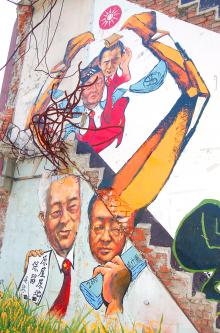In commemoration of the one-year anniversary of the demolition of the Chang Pharmacy in Dapu Borough (大埔), Miaoli County, social activist and artist Liu Tsung-jung (劉宗榮) and others on Friday last week finished a painting on the building’s sole remaining wall.
On July 18 last year, four houses in Jhunan Township’s (竹南) Dapu, including the building housing the Chang Pharmacy, were demolished against the will of their owners to make way for a controversial science park extension project.
Chang Sen-wen (張森文), owner of the the pharmacy, was found dead in an irrigation channel a month after the forced demolition. The cause of death remains unclear.
The Protect Miaoli Youth Alliance, which held the commemoration concert on Friday, said it had asked Liu, who had painted Chang’s portrait for his funeral, to paint the remaining wall of the pharmacy to leave an indelible mark in history.
Liu began painting on Wednesday last week, and he said that he had based his concept for the painting on the shield-shaped badge of the police.
Liu added that he had included the portraits of President Ma Ying-jeou (馬英九), Vice President Wu Den-yih (吳敦義), Premier Jiang Yi-huah (江宜樺) and Miaoli County Commissioner Liu Cheng-hung (劉政鴻) to satirize the government for its forced demolition of citizen’s residences.
However, Liu said that he was afraid his work would hurt the family as it also included a portrait of Chang, adding that he had talked with Chang’s widow Peng Hsiu-chun (彭秀春) many times to avoid misunderstandings.
Liu also documented his painting process through the use of time-lapse photography, a technique that creates the illusion of “speeding up” time, and put it on YouTube.
Titled Justice Not Forgotten (正義,不會忘記), the video uses the Village Armed Youth Band’s (農村武裝青年) song City without Memories (失去記憶的城市) as its background music.
The song includes the lyrics: “Cut down all the trees, and tear down all the heritage. You said you would make green parks and low-carbon emission cities, but you’ve built the cities full of condos and sacrificed our orchards and fields, selling the land on which they grow as commodities.”
The song’s lyrics aptly convey people’s helplessness in the Dapu incident, Liu said, adding that he hoped to let more people understand the incident through the less confrontational medium of art.
Source: Taipei Times - 2014/07/22
Video:





















